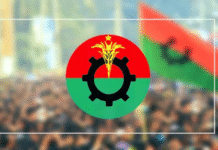Is there nothing new in the offing?
 A few years ago, the Guardian brought out a piece on how the public would be informed in the event of Queen Elizabeth II’s death. The matter gave rise to debate and discussion. Readers, after all, have no idea that journalists prepare the obituaries of renowned persons well in advance. It’s just a matter of waiting for the Grim Reaper to strike. The moment that happens, an account is given of the person’s achievements and successes, joys and sorrow, and all sorts of details. But this is not so in the case of a political party. After all, the demise of a political party does not happen suddenly, just one fine day. It happens gradually, perhaps merging silently with another party or gradually fading to extinction over the decades or generations.
A few years ago, the Guardian brought out a piece on how the public would be informed in the event of Queen Elizabeth II’s death. The matter gave rise to debate and discussion. Readers, after all, have no idea that journalists prepare the obituaries of renowned persons well in advance. It’s just a matter of waiting for the Grim Reaper to strike. The moment that happens, an account is given of the person’s achievements and successes, joys and sorrow, and all sorts of details. But this is not so in the case of a political party. After all, the demise of a political party does not happen suddenly, just one fine day. It happens gradually, perhaps merging silently with another party or gradually fading to extinction over the decades or generations.
There are, of course, exceptions. If the state declares a party unlawful, it can then cease to exist. But being wiped out by state order does not necessarily mean the party cannot be resurrected. The history of Bangladesh bears witness to this. Parties abolished in 1975 gradually re-emerged after 1978 and most of them, through all sorts of ups and downs, remain in existence.
Actually, in Bangladesh the demise of political parties has been reported in advance. Newspapers would regularly come up with such writings in 2014-15, predicting the demise of a party due to its boycott of the 5 January election. The scribes again came up with the contention that if that party didn’t take part in the 2018 election, it would cease to exist. Having lost in an election where the ballot boxes were stuffed with votes on the night before the election, now the death knell apparently rings once again for the party.
It has been assumed that with the obliteration of BNP, unilateral politics will create a sort of stability in Bangladesh, paving the way to undeterred development. There is no concern about the untimely death of democracy or the emergence of a political vacuum. There are no signs of regret. There are no questions being raised about the violation of people’s right to vote in the farcical election where only ruling party nominations counted. Yet the taxpayer’s millions are being spent in the name of such elections.
No political force has spontaneously emerged as an alternative to BNP. Yet there can be no natural social growth without different views. If an opposition party is selected from the ruling alliance, that does not create any alternative. So where does politics feature in running the country now? What is the role of the politicians? Which party in the country is not in a crisis? Even the government’s favoured opposition party faces a dilemma over future leadership. The smaller allies, who were in the ruling alliance for 10 years, are now none too happy with their exclusion from the cabinet.
There is a lot of dissatisfaction also with the reserved seats for women being filled with family nominations. Another party split even before the election and a leader from one of the factions was deprived from being re-elected.
It is not even that the politically active Awami League’s senior leaders are thriving. Having been left out of the cabinet, these veterans have wilted and while away their time with their grandchildren or jotting down their memoirs in newspaper columns.
The party’s manifesto at one time was committed to secular and non-communal politics and to establishing an exploitation-free society based on equality. Now even the most conservative and orthodox religious groups of the country openly say that they have never seen a more religiously blinded government than the present one. Rather than an exploitation-free society, the economy is at its highest peak of inequity.
There was a time when the name of BNP was associated with politics of religion and with free market economy. Ershad followed the same trend. Now Awami League has not only surpassed all others in that trend, but has also consolidated itself in doing so. Owners of banks, insurance companies and readymade garment industries have never had such a market-friendly government before. And the administration as well as the law enforcement agencies has been playing an effective role in suppressing difference of opinion like never before. Just as in the case of development, new precedents are emerging in this regard every day.
Someone had spoken about making politics difficult for politicians. No matter who was the one who said that, the fact remains that this is no longer in the hands of the politicians. Whether right, left or centre, no one has anything to do. The role of political institutions in running the government is gradually diminishing. Basically speaking, it is the administration and law enforcement that are the government’s mainstay. So it comes as no surprise when the loan defaulters are given leeway and the bureaucrats are given interest-free loans to purchase cars and houses.
It is no secret either that the MPs of BNP and the Oikya Front have entered the parliament at the behest of the government. The attempt to create a government-friendly BNP through a well-known politician like Nazmul Huda failed, much to the benefit of certain hitherto unheard of political leaders. If fact, it is said, that their oath taking was approved in order to prevent an emergence of a pro-government BNP. In the process of those hasty measures for damage control, the party’s secretary general lost his parliamentary seat.
The contention that the parliamentary polls have destroyed the country’s election system, led to the boycott of the Dhaka North city corporation election and the upazila polls. In fact, despite BNP being in dire straits, it expelled over a hundred leaders at the grassroots over the upazila election.
While Gono Forum may have gained points in all this mayhem, changes in its leadership and shoddy political patchwork has created unrest within it, rather than any sort of consolidation. Among those who joined the Jatiya Oikya Front despite all sorts of hesitation, Kader Siddiqui is now asking for an explanation about the discrepancies in the coalition’s words and action. BNP’s old allies are not happy either.
Jamaat, which had been a source of discomfort for BNP, is itself now in the throes of a split. Its reformists are preparing to form a new party. The main leader of the original party paid a visit to London last week. The London-based Bangla weekly, Surma, termed this visit as very significant.
The left alliance remains an exception. Some may have left the alliance, but haven’t issued any threats. There hasn’t been any change in leadership in any of its parties either. Perhaps this alliance is too marginal to be affected by the disruptions in national politics and so do not bother themselves over these matters. Then again, it may be because they remain firm in their ideological stance and this has protected them from the political upheavals all around.
Foreign quarters may have had reservations about the election, but have maintained normal relations with the government. However, they do speak out about the right to freedom of expression and the need for a free press. Various civil society organisations speak out similarly too.
However, individual expression of differences and the media cannot fill the political vacuum. Given the present predicament of the media, it can hardly be expected to play such a role. This is evident from the absence of news reports on the prominent post-elections political events, both in the print and the electronic media.
Only a fresh political polarisation dealing with issues like retrieving voting rights from the ruins of the election system, can fill the existing political vacuum. But it is not clear whether those who are so quick in writing obituaries for BNP, actually feel the need for such a alternative.
* Kamal Ahmed is a senior journalist and columnist. This piece appeared in the print edition of Prothom Alo has had been rewritten here in English by Ayesha Kabir









